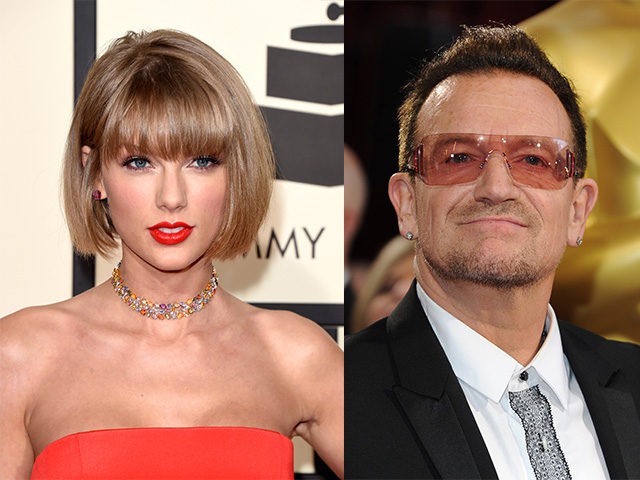Taylor Swift, Paul McCartney and members of U2 have joined hundreds of other music industry heavyweights in signing an open petition to Congress calling for reform of the Digital Millennium Copyright Act (DMCA).
The open letter — sent to lawmakers Monday and posted in advertisements in political trades like The Hill and Politico — is an effort by the music industry to halt what it sees as significant revenue loss from video sharing websites like YouTube.
Other artists who have joined in the effort include members of rock band Kings of Leon, pop star Katy Perry and Aerosmith frontman Steven Tyler.
The DMCA was signed into law in 1998 by then-President Bill Clinton and was meant to address the fair use of music on the Internet. Video-sharing websites like YouTube have used the DMCA to allow millions of songs to be uploaded on their websites, but artists often complain that they have no control over how their music is used and shared.
For its part, YouTube claims it has created innovative online tools to allow artists to see and control how their music is represented, and has made it easier for artists to issue takedown notices.
The petition to Congress was organized by music industry titan Irving Azoff, according to Rolling Stone. Azofff argues that YouTube provides “safe harbor” for widespread copyright infringement using the DMCA as cover.
The DMCA “has allowed major tech companies to grow and generate huge profits by creating ease of use for consumers to carry almost every recorded song in history in their pocket via a smartphone, while songwriters’ and artists’ earnings continue to diminish,” the petition states.
As Breitbart News has previously reported, the music industry still faces several significant revenue challenges as it continues to transition into the digital age, and streaming services and video-sharing website revenues have not yet made up for the steep drop-off in recorded music sales.
Several big-name artists have grown increasingly vocal about profit bleeding in the digital age.
In an interview with Billboard last week, Nine Inch Nails frontman Trent Reznor — an ambassador for Apple’s new Music service — called YouTube’s business “disingenuous.”
“It is built on the backs of free, stolen content and that’s how they got that big,” Reznor said. “I think any free-tiered service is not fair.”
YouTube fired back with its own statement, defending its record on providing compensation to artists whose music appears on the site.
“The overwhelming majority of labels and publishers have licensing agreements in place with YouTube to leave fan videos up on the platform and earn revenue from them,” a rep for the company said in a statement last week. “Any assertion that this content is largely unlicensed is false. To date, we have paid out over $3 billion to the music industry – and that number is growing year on year.”
Swift has also been an outspoken advocate for the protection of artists’ revenues. Last summer, the pop superstar took aim at Apple for failing to pay artists during the company’s three-month trial period for its Music service.
Apple ultimately relented, and Swift cut an ad for them in April.
(This article was updated to correct the name of the 1998 law; it is the Digital Millennium Copyright Act)
Follow Daniel Nussbaum on Twitter: @dznussbaum

COMMENTS
Please let us know if you're having issues with commenting.